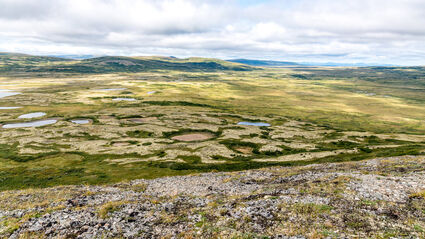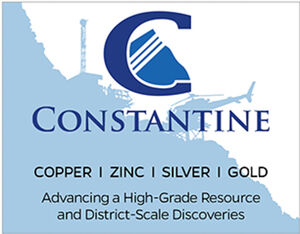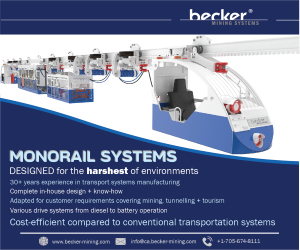Pebble assails Corps economic findings
Asserts 20 years of economic benefits is better than none North of 60 Mining News – March 19, 2021
Last updated 3/25/2021 at 4:01pm

Pebble Limited Partnership
Pebble Partnership has provided employment to Bristol Bay residents through the exploration of the world-class copper-gold-molybdenum-rhenium deposit and hopes to continue providing jobs during more than 20 years of mining.
The U.S. Army Corps of Engineers does not subscribe to the idea that it is better for the residents of the Bristol Bay region of Southwest Alaska to have worked and lost than never to have worked at all.
In its public interest review for the Pebble project, Army Corps determined that some Bristol Bay residents that become accustomed to increased income and lower living costs from developing Pebble may be forced to move out of the region or lower their standard of living after a mine at the copper-gold-molybdenum-rhenium deposit ends.
These are among the "economic detriments" Northern Dynasty Minerals Ltd. is challenging in its appeal of Army Corps' negative record of decision for Pebble last November.
A request for appeal prepared by Pebble Limited Partnership, a Northern Dynasty subsidiary formed to advance the Pebble project, was accepted by the Army Corps Pacific Ocean Division in February.
In its appeal, the Pebble Partnership wrote that the social and economic impact conclusions in Army Corp Alaska District's public interest review give "undue weight to speculative harms not supported by the record while giving little weight to the project's undisputed benefits to local communities, the region, and the state."
"In sum, the record demonstrates the significant, long-term socio-economic benefits of the project to local communities, including jobs, infrastructure, health, education and decreased cost of living. Nonetheless, the ROD outrageously asserts that there are adverse economic effects that would outweigh the benefits at the local and regional level. The (Alaska) District relies on pure conjecture to support this finding," the company penned in the appeal.
Impacts on subsistence are listed among the economic detriments cited by Army Corps.
"If high-harvesting members of the community find project-related employment and have less time for subsistence activities, the rest of the community and households in other communities could end up receiving less wild food through sharing and trading relationships," the federal permitting agency penned in its Pebble record of decision. "Increased employment of adults in the communities could impede the amount of time spent teaching young people to hunt, fish, gather, process, and preserve subsistence resources which would impact the amount and quality of traditional knowledge passed on to younger generations, potentially resulting in a long-term or permanent adverse effect to communities."
This is the opposite of what has been found at other rural Alaska mines such as Red Dog in Northwest Alaska.
Representatives from NANA, the Alaska Native Claim Settlement Act (ANCSA) that owns the land where the Red Dog zinc deposit is found, have said Northwest Alaska residents who work at the mine have more time and resources for subsistence activities due to the rotational schedule and wages.
This is on top of the enormous economic opportunities Red Dog has brought to the NANA region.
"It has been a revolutionary thing for our region economically and demonstrates the kind of development that can be done that not only benefits the local people but protects the environment," said Willie Hensley, who was active in the founding of NANA and subsequent development of Red Dog.
More information on the economic benefits mining has brought to Northwest Alaska can be read at NANA – "Two worlds, one spirit" in the March 1, 2019 edition of North of 60 Mining News: https://www.miningnewsnorth.com/story/2019/03/01/in-depth/nana-two-worlds-one-spirit/5630.html.
In the final environmental impact statement for Pebble, which informed the record of decision, Army Corps found that Bristol Bay households with other income were among the most prolific subsistence providers.
"The magnitude of the effect of income is such that in many communities, 30% of households produce 70% of the subsistence harvest. These 'super households' are distinguished because they include multiple working-age males, tend to have high incomes, and often are involved in commercial fishing. These three factors support high-producing households to be able to combine subsistence activities with paid employment and to arrange considerable labor in flexible ways that maximize harvests of subsistence foods, which are then shared with other households in the community and region," Army Corps penned in the FEIS.
Which contradicts the federal agency's later assertion that Pebble-related employment may impede subsistence activities and ignores the fact that Bristol Bay residents can choose whether or not to work at a future mine there.
"The idea that it is a detriment to have a project that offers employment because jobs could change the local way of life is an insult to the adaptability of the local communities," Pebble Partnership penned in its appeal.
In addition to effects on subsistence, many of the economic detriments cited by Army Corps are related to an economic slowdown in the Bristol Bay region after mining at Pebble has ended.
In its record of decision, the federal agency wrote that after the jobs and economic benefits associated with a Pebble Mine ends "some residents may move to find new employment" and "some decreases of cost of living may increase to pre-project levels."
"The implication being that locals would be better off never having the jobs and associated benefits in the first place so that they do not have to 'adjust' when the jobs go away," Pebble Partnership wrote.

Pebble Limited Partnership
A view over the copper-gold-molybdenum-rhenium deposit Pebble Partnership hopes to mine in the Bristol Bay region.
Outmigration due to lack of economic opportunities is something that is already happening in the Bristol Bay region and is a primary reason some residents, especially those living closest to Pebble, have advocated in favor of development of a mine there.
"If the 20-plus years of mine-related employment gives the local community greater economic stability, reduces out-migration, and lowers the cost of living for two decades – isn't that still an economic benefit even if the conditions return to baseline after closure?" Pebble asked Army Corps.
Federal guidelines suggest that the appeals process should take 90 days, but Army Corps has indicated that the Pebble appeal could take longer due to the volume of material that needs to be considered and the complexity of the issue.
A request of appeal issued by the state of Alaska, which is the underlying landowner where the Pebble deposit is located, was rejected by Army Corps.

















Reader Comments(0)